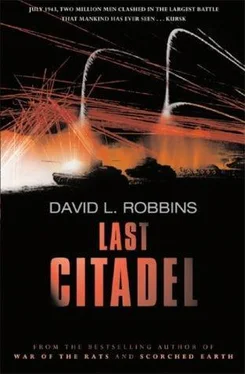A hundred meters away, the Borisovka rail line ran over flat ground. To make the tracks easier to protect from partisan sabotage, the Germans had mowed down a wide swath of trees beside the tracks for miles in every direction. Tonight, two-man patrols walked the rails with flashlights. The guards ambled past every four to five minutes, shining their lights down at the rail ties. Filip watched them without blinking, with a bird-of-prey focus.
Ivan wiped his hands on his jacket. The C-3 became malleable in Katya’s grasp, she was excited by the danger, the peril of rolling a powerful explosive in her fingers. She imagined them all going up in a red burst out of her hands.
Ivan breathed, ‘Daniel?’
The thin one came close. He and Ivan had both been regular army soldiers, privates. Each had been captured by the Germans and escaped, and both had been found separately wandering behind enemy lines by the partisans. Daniel had been born in this part of the steppe; he told Katya that Plokhoi had stopped him from going home. With the partisan band they risked their lives just as much as they had fighting on the front lines, but now in civilian clothes they enjoyed more status – now they were considered even more as military men. Plokhoi had made them leaders.
Daniel brought out from his jacket pocket two small wooden cartons. He handed them down to Ivan, who took the boxes with uncharacteristic gingerness. The big man set one aside and opened the other for Katya, as though showing her a gem. Inside, on a bed of cotton, lay something that resembled a copper bullet casing with antennae.
‘Blasting cap,’ she said.
‘Definitely.’ Ivan raised his grin to Daniel, squatting next to them. ‘They say I’m the dumb one, but I’m smart enough not to carry these damn things around.’
Daniel didn’t mind the gibe. He brought down a slender finger to the cap, such a clean and comfortable thing, in bed in its little wooden home.
‘These babies have a bad temper. Ivan’s too clumsy to carry them. He falls down a lot. You do that with one of these in your pants, you don’t get up the same man.’
Katya snickered at this, drawing a shush from Josef. The older man kept himself apart while spooling the long detonation wire around his arm.
Daniel continued, unchastened. ‘Here’s how it works. The C-3 explodes at a rate of about twenty-five thousand feet per second. To detonate it, you need to make a faster explosion. That’s why C-3 won’t blow up if you just burn it or hit it. That’s where the blasting cap comes in. You push the cap into the plastique, hook these two wires up to the electric firing cord, send a current down the wire, and the cap goes off just a little faster than the C-3.’ He raised both hands. ‘Boom.’
‘Boom,’ repeated Ivan, savoring the word and the concept.
Daniel lifted the little cap off its cotton pillows. He fingered the twin slender wires sticking out of one end. The wires were crimped together in the middle by a tiny round tab.
‘They’re very sensitive, these bastards. Anything can set them off. So once you got the C-3 stuck to whatever it is you’re going to blow, and you got the wires attached, you make sure you take off this little piece. This keeps the two wires touching, see? To short them out. Once this is gone, the cap is live.’
Daniel returned the copper detonator to its case and closed the lid. He reached down to scoop up both boxes. Ivan took the doughy C-3 from Katya’s oily and stained hands. She wiped them on her pants, like Ivan. When they were clean, Daniel handed her the two boxes.
‘You and me, Witch.’
Katya hefted the twin cartons, almost weightless in her palms. She waited for Daniel to tell her he was kidding. ‘Me?’
‘Why not? At this point you know everything the rest of us know about this stuff.’
Josef stalked forward. ‘You and Daniel are the smallest and quickest. You’ll go.’
The urge pulsed in Katya to mount an argument, that she’d never done anything like this before. But she looked around at ox-like Ivan, crotchety Josef, and ancient Filip – the elder gazed at her with a ‘you want me to go?’ shrug – and clamped her lips. Suddenly she missed her U-2 and the thousands of feet she used to have between her and the Germans.
‘Fine,’ she whispered. Josef finished with the firing cord and checked his watch. He laid the wire on the ground and crept to the edge of the bushes to join Filip. Daniel grabbed up the long black loops and hoisted them over his shoulder, they hung almost to his boots. He found one loose end and handed it to Ivan. The large man dug in his knapsack for the handheld detonating machine and set about stripping the firing-cord wires. Katya held the blasting-cap boxes one in each hand, very aware of keeping them cozy and still. Her palms began to sweat, and she wondered how sensitive these temperamental caps were to nerves.
They waited for another five minutes. No one moved, except Josef, who glanced up and down from his watch to the strolling, then disappearing, German guards and their flashlights. Katya knew there was another five-man demolition team waiting a mile south down the track. The plan was simple for each squad: two in the team set the charge; one stays on the detonator; two slither out and try to bag a prisoner for Plokhoi to interrogate. This was the Battle of the Rails, fought throughout the occupied territories, designed to disrupt the flow of German trains to the front. The Russian road system was so primitive the Nazis had no choice but to rely on the railroads to supply their men and weapons. The partisans knew this and carried the fight to the enemy here. But tonight, Katya hoped, there would be no fight, just a quick strike.
The Germans had lax security at this point in the Borisovka line. At other spots – bridges, bends in the line, downhill runs, all places where the partisans were most likely to hit – the Germans maintained garrisons and watchtowers, and even this was a partisan victory because every enemy soldier safeguarding the railways against the guerillas was one more German soldier not battling on the front. Plokhoi may be a madman, he may even be as bad as his nomme de guerre implied, but he was clever and disciplined. He hewed to the partisan motto: Attack the weak, fly from the strong.
Katya held the two cap boxes apart as though they might react even to each other. How could Daniel carry them around like they were candy bars? She looked at her partner kneeling beside her. He was reed-thin and chewing a blade of grass. He nodded to himself, some song or pulse playing in his head. She had seen her horses do this at the starting line years ago in the dzbigitkas , champing, bobbing, ready to bolt. Ah, well, she thought, Papa, another podvig . Where are you? You used to love to watch me race. So, watch now. Here we go.
She sensed the starting moment come, and it did. Josef lifted his face from his watch and whispered, ‘Go.’
Daniel moved first, lugging the long links of cord. Katya stumbled out of the bushes; her heart leaped into her mouth, she started to use her hands to catch herself but couldn’t because of the caps. She struck a knee to the ground and expected to explode. She didn’t, and heard Josef cluck his tongue in disgust.
Daniel lit out for the rails, she followed in his wake. The moonlight out on the flat, cleared ground was milky, just enough of a silver wash to discern shapes at close range and no more. To their right, about fifty meters past them, a two-man patrol had already gone by, playing their beams on the rail ties. Skinny Daniel skittered bent at the waist, the loops of the cord dragged the ground and Katya was afraid of the noise they made scurrying to the rails. She ran awkwardly, too, with both hands before her, still wary of offending the blasting caps. But the guards continued to move off on their rounds and the two reached the tracks. They collapsed on their bellies beside the rails, catching their breaths, trying not to betray themselves from the exertion of the run.
Читать дальше












